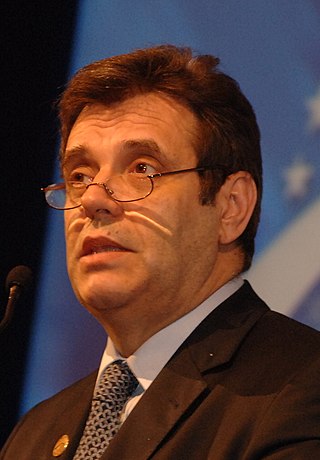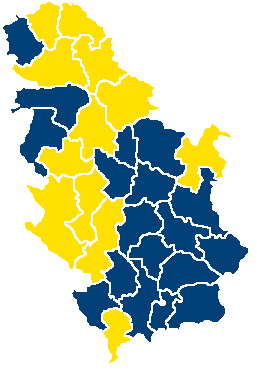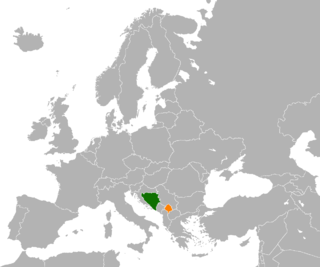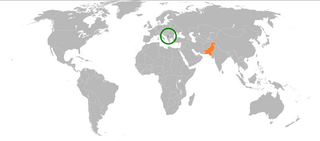
Vojislav Koštunica is a Serbian former politician who served as the last president of FR Yugoslavia from 2000 to 2003 and as the prime minister of Serbia from 2004 to 2008.

Boris Tadić is a Serbian politician who served as the president of Serbia from 2004 to 2012.

Dominique François Joseph Mamberti is a French prelate of the Roman Catholic Church and the Prefect of the Apostolic Signatura in the Roman Curia. He was elevated to the rank of cardinal by Pope Francis in 2015.

Presidential elections were held in Serbia on January 20 and February 3, 2008. Incumbent President Boris Tadić was re-elected as president in the second round with 51% of the vote, defeating challenger Tomislav Nikolić.

International governments are divided on the issue of recognition of the independence of Kosovo from Serbia, which was declared in 2008. The Government of Serbia does not diplomatically recognise Kosovo as a sovereign state, although the two countries have enjoyed normalised economic relations since 2020 and have agreed not to try to interfere with the other's accession to the European Union.

Kosovo–Malaysia relations are foreign relations between Kosovo and Malaysia. Formal relations between the two countries first began in 2000, when Malaysia became the first Asian country to establish a liaison office in Kosovo. Kosovo declared its independence from Serbia on 17 February 2008 and Malaysia recognised it on 30 October 2008.

The relations of Bosnia and Herzegovina and Kosovo are unofficial because Bosnia and Herzegovina's central government has not recognized Kosovo as an independent state, essentially through the veto of the Bosnian Serb-dominated Republika Srpska. Bosniak and Croat members of the Presidency want to recognise Kosovo, but Serb members refuse. Bosnia and Herzegovina's constitution requires consensus among all three members in order to perform such an action. Bosnia-Herzegovina remains the only country of the former Yugoslavia that does not recognize Kosovo's independence.

The Palestinian–Serbian relations are bilateral relations between the State of Palestine and the Republic of Serbia. Relations between Serbia and Palestine have been very close and friendly.

Egyptian–Kosovan relations are foreign relations between Egypt and Kosovo.
Kosovo's declaration of independence from Serbia was enacted on Sunday, 17 February 2008 by a unanimous vote of the Assembly of Kosovo. All 11 representatives of the Serb minority boycotted the proceedings. International reaction was mixed, and the international community continues to be divided on the issue of the international recognition of Kosovo. Slovakia's reaction to the 2008 Kosovo declaration of independence is one of non-recognition, but it has given indications that its stance could change in the future.

Kosovo's declaration of independence from Serbia was enacted on Sunday, 17 February 2008 by a unanimous vote of the Assembly of Kosovo. All 11 representatives of the Serb minority boycotted the proceedings. International reaction was mixed, and the world community continues to be divided on the issue of the international recognition of Kosovo. Armenia's reaction to the 2008 Kosovo declaration of independence has been one of non-recognition, mainly due to concerns about the implications for its own territory claims.

Kosovo–Pakistan relations refer to the bilateral ties between the Republic of Kosovo and the Islamic Republic of Pakistan. Kosovo is a partially recognized state that is claimed by Serbia in its entirety as the Serbian province of Kosovo and Metohija. On 24 December 2012, Pakistan recognized Kosovo as an independent state, becoming the 98th state to do so. Simultaneously, Pakistan's ambassador to Turkey in Ankara was accredited to Kosovo.

Kosovo's declaration of independence from Serbia was enacted on Sunday, 17 February 2008 by a unanimous vote of the Assembly of Kosovo without popular referendum. All 11 representatives of the Serb minority boycotted the proceedings. International reaction was mixed, and the world community continues to be divided on the issue of the international recognition of Kosovo. Libya extended official diplomatic recognition to Kosovo on 25 September 2013. Serbian president Aleksandar Vučić announced in 2023 that Libya has withdrawn recognition of Kosovo.

Kosovan–Singaporean relations are foreign relations between the Republic of Kosovo and the Republic of Singapore. Singapore recognised the Republic of Kosovo as an independent state on 1 December 2016. Kosovo and Singapore established diplomatic relations on 1 December 2016.

Argentinian–Kosovar relations are foreign relations between Argentina and Kosovo. Formal diplomatic relations between two states are non-existent as Argentina does not recognize Kosovo as a sovereign state.

Azerbaijani–Kosovan relations are foreign relations between Azerbaijan and Kosovo. There are no formal diplomatic relations between the two states as Azerbaijan has not recognized Kosovo as a sovereign state.

Georgian–Kosovar relations are foreign relations between Georgia and Kosovo. Formal diplomatic relations between two states are non-existent as Georgia does not recognize Kosovo as a sovereign state.

Iraqi–Kosovar relations are foreign relations between Iraq and Kosovo. Formal diplomatic relations between two states are non-existent as Iraq does not recognize Kosovo as a sovereign state.

Kosovar–Ugandan relations are foreign relations between Kosovo and Uganda. Formal diplomatic relations between two states are non-existent as Uganda does not recognize Kosovo as a sovereign state.

Kosovar–Moroccan relations are foreign relations between Kosovo and Morocco. Formal diplomatic relations between two states are non-existent as Morocco does not recognize Kosovo as a sovereign state.




















